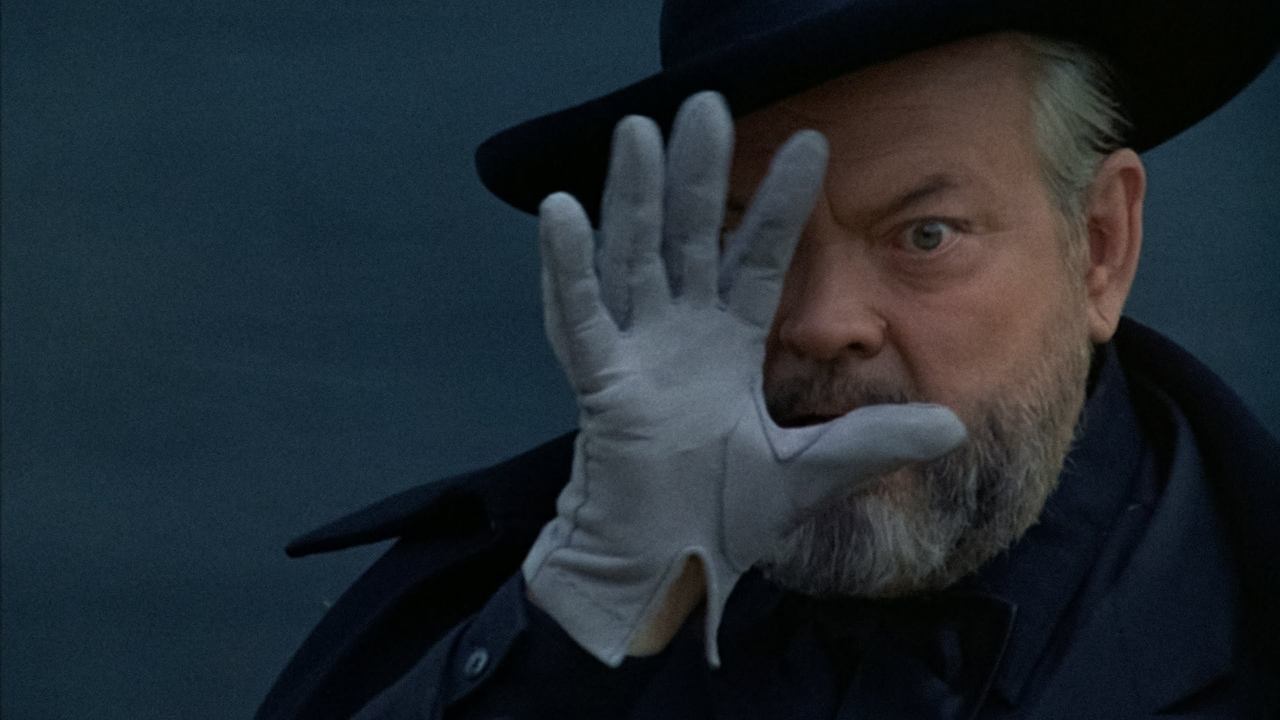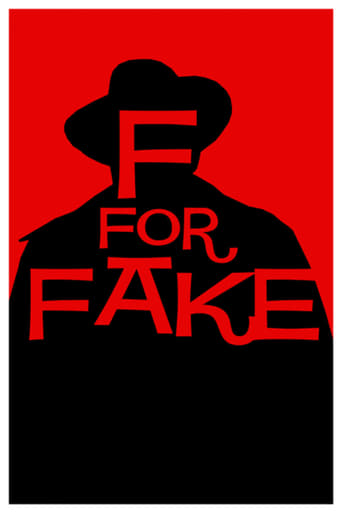

The greatest movie ever made..!
... View MoreEasily the biggest piece of Right wing non sense propaganda I ever saw.
... View MoreA clunky actioner with a handful of cool moments.
... View MoreIt's simply great fun, a winsome film and an occasionally over-the-top luxury fantasy that never flags.
... View MoreA documentary about fraud and fakery, which focuses on Elmyr de Hory's recounting of his career as a professional art forger.Clifford Irving is something of a legend, and definitely belongs in this film for his work as author of a fraudulent Howard Hughes authorized biography. This film purports that Irving and deHory both worked their schemes from the same tiny island, and yet were in no way connected.Sadly, De Hory would commit suicide a few years after the release of Welles' film, on hearing that Spain had agreed to turn him over to the French authorities."F for Fake" faced widespread popular rejection. Critical reaction ranged from praise to confusion and hostility, with many finding the work to be self-indulgent and/or incoherent. "F for Fake" has grown somewhat in stature over the years as cinephiles revere almost anything the notorious filmmaker made.The question remains: how much of this film itself is true or just one big hoax?
... View MoreF for Fake (1973)** 1/2 (out of 4) Orson Welles' final major picture started off as a documentary on art forger Elmyr de Hory but when that project led to an interview with Clifford Irving, the man who wrote the fake Howard Hughes biography, the documentary took a new turn and decided to look at fakes all around. This really isn't your typical documentary and many critics of the film will say it makes very little sense and all in all is nothing more than an incoherent mess. I wouldn't go that far but I think F FOR FAKE is certainly more style than actual substance. I say that because Welles visual style here is something that you didn't see in documentaries at the time and I'd say that nothing that followed really looked the same. The documentary has an avant garde feel to it and most of them comes from the editing. The editing goes all over the place with all sorts of weird edits, different styles of cameras being used and the editing usually takes the story and tells it in a different time frame and I think this is where people get lost. The look of the film is certainly something impressive and you really can turn the volume down and be entertained just by the look that Welles made. However, this "style" is so good that it really takes away from the stories being told and I think it really kills most of the interest in the subjects. I think the way the story goes back and forth does make the film incoherent but this is also due to the fact that the material just isn't worth following. I think had Welles made a more traditional documentary then the story would have been more entertaining. As is, the story just gets lost in the style and in the end you really don't learn anything about either man. We even get a quick clip about The War of the World hoax that landed Welles not in jail but in Hollywood. What actually keeps the film entertaining is the performance of Welles being himself and hosting. He comes off so good and charming that it at least keeps you awake even when the story itself goes under. F FOR FAKE is considered by some to be horrid while others see it as another Welles masterpiece. I'm in the middle thinking it shows some signs of greatness but in the end it's just too rough around the edges to really work.
... View MoreIf you like Orson Welles -- the man and the voice -- you'll love this. He wanders through this documentary in his black cape and wide-brimmed hat, puffing on a colossal cigar, using his walking stick as a lecturer's pointer, and reciting the writers' lines, and some quotes from Kipling, in that mellifluous, sonorous baritone. He sounds like a stage hypnotist. He even gets to demonstrate some of his magic, making bodies disappear (through phony photography). He's a complete fake. He admits it freely and he's utterly charming.Substantively, the chief subject is Elmyr de Hory. He's a big fake too, a Hungarian gnome whose own painting failed to sell, so he took to more or less expertly copying the works of the masters -- Picasso, Toulouse-Lautrec, practically anybody. He can dash off a Bernard Buffet in the blink of an eye and then cheerfully burn it in the fireplace. He spent a little time in jail but, as he insists, he was "interned" over some passport dispute, not doing time as a prisoner. As of the time of filming, de Hory lives in a mansion on Ibiza overlooking the Mediterranean. He speaks several languages, hosts international celebrities at lavish parties. But he mourns that he's only renting this palace. He doesn't own it. He has hardly a penny.Does he blame himself for having blatantly defrauded innumerable museums and art collectors? Like hell. To hear de Hory tell it, he was performing a public service. Man, did he teach those so-called art experts a lesson in humility. He ought to get a medal.Less time is given over to other frauds, sometimes in a confusing manner. Clifford Irving -- who is by now mostly forgotten -- shows up as a de Hory admirer on the periphery. Irving did a biography of de Hory. I don't know if the art experts learned anything from de Hory but Clifford Irving certainly did. Irving cooked up a fake autobiography of billionaire Howard Hughes and got caught. You can catch Richard Gere giving a fake sympathetic portrait of Clifford Irving in "The Hoax." Also present are some other frauds, including Oja Kodar, a beautiful young woman who was Picasso's mistress and model during his last years. He pained some twenty portraits of her, most unrecognizable. She convinced him that the portraits should be hers and kept private. Picasso agreed and shortly after Kodar left, she was raking in the shekels by showing them in movable displays. At least that's the impression I got. It was all a little murky, like the fake fog in which Kodar herself is enveloped on screen.The general point being made, I think, is that the world is full of deceit -- in and out of the snobbish art world. Well, that's unarguable. All of us lie all the time, beginning with exchanges like: "How are you today?" "Fine." Every sociologist knows this.But for all the flamboyance of the narration, all the flowery prose, it misses something. Namely, it misses the fact that some fakes are worse than others. De Hory's fakes cost people a lot of money, one way or another. If he wanted to teach the art world a lesson, why didn't he paint a bunch of convincing fakes and display them and sell them for what they really were? His professed motive is as fake as his product. That's not even to get INTO Clifford Irving, the smooth-talking snake-oil salesman who finagled something like a million-dollar advance on his carefully contrived "autobiography" of Hughes. When interviewed about the affair after his conviction, Irving quickly switched his role from "perp" to "vic," carrying on about how his children suffered during his troubles.Of course de Hory is charming, and so is Irving, and so was Bernie Madoff. They MUST be charming if their lies are to be believed. The film left me feeling as I always do when I think about these psychopaths. They shouldn't be living in mansions, they shouldn't be beaming about their accomplishments in a movie. They ought to be in jail.
... View MoreOrson Welles's final completed movie deals with fakery, and in particular with two of the most notorious forgers of the twentieth century. "F is for Fakes" (also called "F for Fake") is not really a movie or documentary as much as a look at how we interpret art, and what we WANT to interpret about anything that is essentially fake. Welles proudly calls himself a charlatan while performing magic tricks and coming up with all sorts of ways to play with the audience. I personally had never heard of Elmyr de Hory until watching this, but Welles turns him into a very interesting person.All in all, the director known as a boy genius had a fine end to his career. Welles created a truly mind-bending look at the concept of art. The fact that the movie came out around the time that Clifford Irving's scandal broke (he wrote a forged biography of Howard Hughes) certainly adds to the documentary's quality. Can there truly be any more definite reality left in the world?
... View More